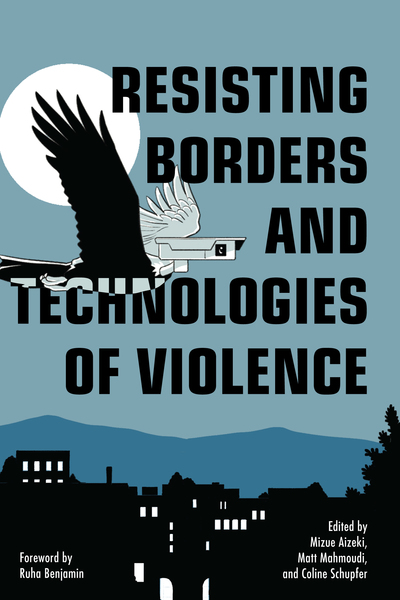
RESISTING BORDERS AND TECHNOLOGIES OF VIOLENCE
Edited by Mizue Aizeki, Matt Mahmoudi, and Coline Schupfer
Foreword by Ruha Benjamin
Haymarket Books (13 February 2024)
Trade paper • ISBN-13: 9781642599114 • US $22.95 • 5.5 in x 8.5 in • 300 pgs.
ABOUT THE BOOK:
The border regimes of imperialist states have brutally oppressed migrants throughout the world. To enforce their borders, these states have constructed a new digital fortress with far-reaching and ever-evolving new technologies. This pathbreaking volume exposes these insidious means of surveillance, control, and violence.
In the name of “smart” borders, the U.S. and Europe have turned to private companies to develop a neocolonial laboratory now deployed against the Global South, borderlands, and routes of migration. They have established immigrant databases, digital IDs, electronic tracking systems, facial recognition software, data fusion centers, and more, all to more “efficiently” categorize and control human beings and their movement.
These technologies rarely capture widespread public attention or outrage, but they are quietly remaking our world, scaling up colonial efforts of times past to divide desirables from undesirables, rich from poor, expat from migrant, and citizen from undocumented. The essays and case studies in Resisting Borders and Technologies of Violence shed light on this new threat, offering analyses of how the high-tech system of borders developed and inspiring stories of resistance to it.
The organizers, journalists, and scholars in these pages are charting a new path forward, employing creative tools to subvert the status quo, organize globally against high-tech border imperialism, and help us imagine a world without borders.
PRAISE:
“The essays in Resisting Borders and Technologies of Violence are all excellent, but collectively add up to more than their parts, a keyhole look into the future, where new repressive technologies will be met by new forms of creative resistance. Mizue Aizeki, Matt Mahmoudi, and Coline Schupfer have put together a vital collection of essays that help us imagine escaping what they have in store for us.”
Greg Grandin
“In a world awash with violent borders, this book serves as a beacon of hope guiding us towards a more just future.“
Reece Jones, author of Nobody Is Protected: How the Border Patrol Became the Most Dangerous Police Force in the United States
“A valuable resource for those trying to dismantle technologized regimes of state terror around the world and create something life-giving in their place.”
Ben Tarnoff, author of Internet for the People: The Fight for Our Digital Future
“Resisting Borders and Technologies of Violence is an essential book for the difficult times we find ourselves in. This collection provides vital insight and nuance about the political, social, and technological dynamics of borders and technologies of coercion. Far more than just lines on a map, this book illuminates how modern borders are more fluid and complex than ever, but perhaps most importantly, how we can organise against them. Through compelling case studies and meticulous research, readers will find the book to be an essential resource for building movements that can fight back against technological authoritarianism in various forms.”
Lizzie O’Shea, author, Future Histories: What Ada Lovelace, Tom Paine, and the Paris Commune Can Teach Us About Digital Technology
ABOUT THE AUTHORS:
Mizue Aizeki is the Director of Surveillance,Technology, and Immigration Policing at the Immigrant Defense Project (IDP). Aizeki’s photographic work appears in Dying to Live, A Story of U.S. Immigration in an Age of Global Apartheid and Policing the Planet.
Matt Mahmoudi is Researcher/Adviser on Artificial Intelligence & Human Rights at Amnesty Tech, where he has spent the last two years leading the effort to ban facial recognition technologies. He is an Affiliated Lecturer at the University of Cambridge. Mahmoudi is co-author of the book Digital Witness, published by Oxford University Press.
Coline Schupfer is a consultant working with the International Institute for Environment and Development and Open Society Foundations on community-based public interest litigation. She has written for publications including the International Justice Monitor, Border Criminologies, Opinio Juris, and the Asia Pacific Journal on Human Rights and the Law.
Ruha Benjamin is an internationally recognized writer, speaker, and professor of African American Studies at Princeton University, where she is the founding director of the Ida B. Wells Just Data Lab. She is the award-winning author of Race After Technology: Abolitionist Tools for the New Jim Code and editor of Captivating Technology, among many other publications. Her work has been featured widely in the media, including the New York Times, the Washington Post, CNN, The Root, and The Guardian.
RIGHTS INFORMATION:
Please contact subagents for the following languages and territories:
| Language/Territory | Subagent |
|---|---|
| China, Taiwan, Indonesia, Malaysia, and Vietnam | Big Apple Agency |
| Dutch | Sebes & Bisseling Literary Agency |
| English outside North America | David Grossman Literary Agency |
| French | Deborah Druba Agency |
| German | Paul & Peter Fritz AG Literatur Agentur |
| Greek | Read n' Right Agency |
| Hebrew | The Deborah Harris Agency |
| Italian | Berla & Griffini Rights Agency |
| Japanese | The English Agency (Japan) Ltd |
| Korean | BC Agency, or Korea Copyright Center |
| Portuguese | RIFF Agency |
| Russia/Baltics/Eastern Europe | Prava I Prevodi |
| Scandinavia | Sebes & Bisseling Literary Agency |
| Spanish in Latin America | MB Agencia Literaria |
| Spanish in Spain | MB Agencia Literaria |
| Turkish | Anatolialit Agency |
For all other languages/territories, please contact Roam Agency.
